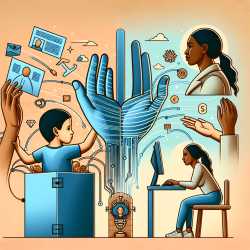Introduction
The COVID-19 pandemic has been a catalyst for many changes across various sectors, including the criminal justice system. A recent study titled "The COVID-19 pandemic behind bars: Experimental evidence showing higher support for decarceration when framed as risk to correctional staff" provides intriguing insights into public support for decarceration. This blog will explore how these findings can be applied to improve online therapy services for children, particularly in the context of the unique challenges posed by the pandemic.
Understanding the Research
The study conducted an experiment to determine how framing the risks of COVID-19 in correctional facilities impacts public support for decarceration. The results indicated that public support was higher when the risks to correctional staff were highlighted compared to the risks to imprisoned individuals. Specifically, 40% of respondents supported decarceration when the impact on staff was emphasized, compared to 31% when the focus was on imprisoned individuals.
These findings suggest that the way information is framed can significantly influence public opinion. For practitioners in speech-language pathology and online therapy, this highlights the importance of communication strategies in garnering support for initiatives that benefit children.
Applying the Findings to Online Therapy
Online therapy services, such as those provided by TinyEYE, have become increasingly important during the pandemic. The insights from the decarceration study can be leveraged to enhance these services in several ways:
- Effective Communication: Just as framing influenced public support for decarceration, the way we communicate the benefits of online therapy can impact its acceptance and success. Emphasizing the positive outcomes for children and the support it provides to educators and families can increase buy-in from stakeholders.
- Data-Driven Decisions: The study underscores the importance of using data to inform decisions. Online therapy practitioners should collect and analyze data on therapy outcomes to continuously improve services and demonstrate their effectiveness to schools and parents.
- Cultural Sensitivity: The study found variations in support for decarceration among different racial and ethnic groups. Similarly, online therapy should be tailored to meet the cultural and linguistic needs of diverse student populations to ensure equitable access and outcomes.
Encouraging Further Research
The findings from the decarceration study open up avenues for further research in the field of online therapy. Practitioners are encouraged to explore how different communication strategies can influence the acceptance and effectiveness of online therapy services. Additionally, research into the long-term outcomes of online therapy for children can provide valuable insights for improving these services.
Conclusion
The COVID-19 pandemic has highlighted the need for innovative solutions in various fields, including online therapy for children. By applying the insights from research on decarceration, practitioners can enhance their communication strategies, make data-driven decisions, and ultimately improve outcomes for children. As we continue to navigate the challenges of the pandemic, ongoing research and adaptation will be key to success.
To read the original research paper, please follow this link: The COVID-19 pandemic behind bars: Experimental evidence showing higher support for decarceration when framed as risk to correctional staff.










